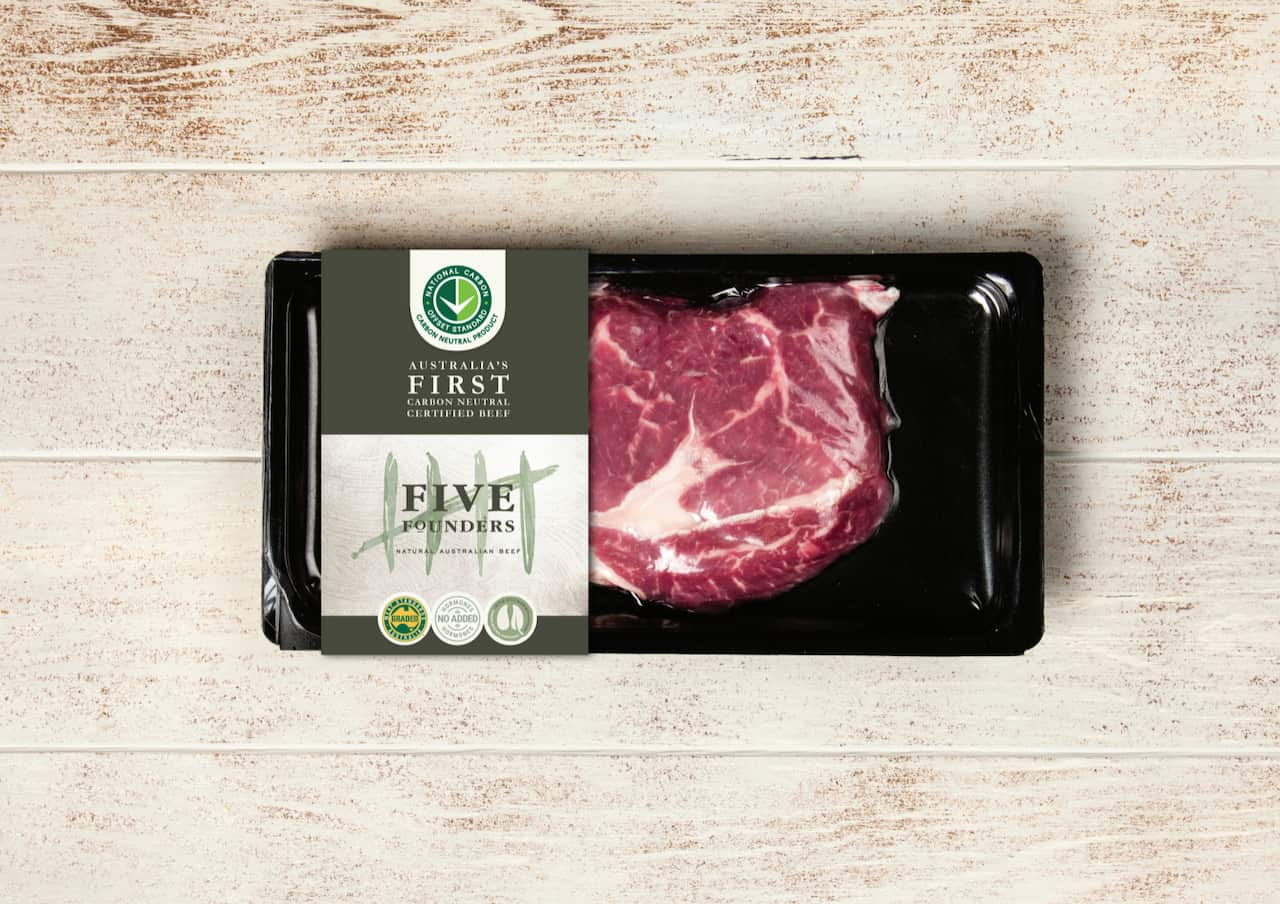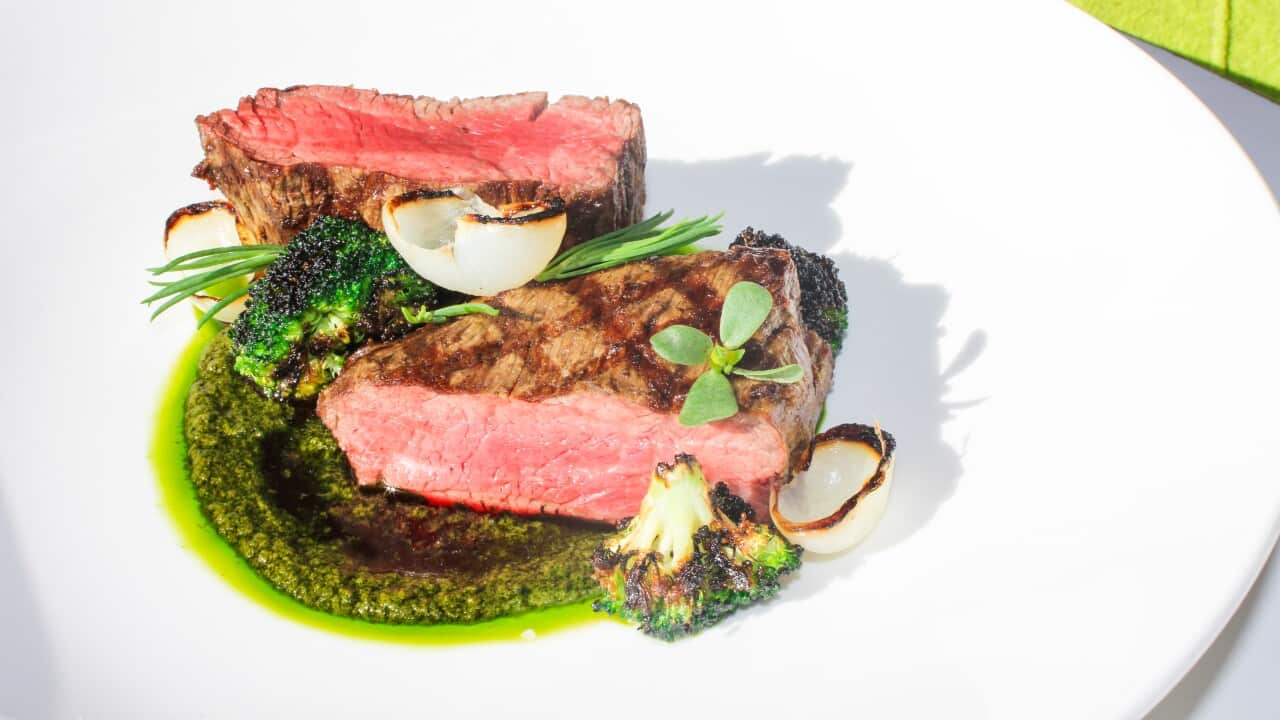Diners who care about climate change and have a desire to eat their way to a more sustainable food world may be able to dive into a side of juicy steak without feeling so guilty. suggest that, given the rising size of the global population in the face of climate change, could be
A new product on the Australian red meat market, available at select restaurants and retailers across the country, is carbon-neutral beef.
As the term suggests, carbon-neutral beef is beef that has a zero carbon footprint.
Although the concept of carbon-neutral beef seems contradictory – after all, cattle are some of the s on the planet – the companies behind the new beef product attest to its greener credentials.
It’s the same product but the carbon emissions associated with the beef have been offset.
When , a Victorian-based meat distributor, launched its carbon-neutral beef program late last year, it became the first meat company in Australia to fully offset all carbon emissions from its business and every kilogram of meat sold. It currently supplies carbon-neutral beef to Melbourne restaurants such as Vue de monde, Rockpool Bar & Grill and MoVida.
“Carbon-neutral beef doesn’t taste any different to other beef,” James Madden, managing director of Flinders + Co, tells SBS. “It’s the same product but the carbon emissions associated with the beef have been offset. So hopefully, it will help people feel a little bit better about the environmental impact of that product.” Madden explains that the release of its carbon-neutral beef program followed a realignment of the company so that it now has a new purpose – to cultivate a better food world.
Madden explains that the release of its carbon-neutral beef program followed a realignment of the company so that it now has a new purpose – to cultivate a better food world.

The North Australian Pastoral Company, a privately owned cattle company, has launched a new brand of certified carbon-neutral beef called Five Founders. (Image: Five Founders). Source: Five Founders
“We had to do something to back up that nice fuzzy statement. Millennials, which is a big part of our company base, have a very finely tuned bullshit detector. You’ve really got to walk the walk if you’re going to talk the talk.”
So the company measured its complete carbon footprint at every point in the beef supply chain – from the moment a cow is born to its death in the abattoir and the transportation of its meat to the consumer. The company then took steps to reduce its own emissions and made up for the shortfall by purchasing carbon credits to offset the remainder. “The result is that we became carbon-neutral.”
The carbon economy doesn’t need to be a drag on everyone,” says Madden. “It can do some wonderful work for good.
Taking environmental responsibility across the globe
One of the that Flinders + Co now supports is Lifestraw, which operates across Kenya and Cambodia. The income generated from carbon credits helps to pay for the distribution of water purification units to poor families. These units give families access to clean drinking water without needing to boil their water using coal or wood. The result is that families also generate a lower rate of carbon emissions.
“The carbon economy doesn’t need to be a drag on everyone,” says Madden. “It can do some wonderful work for good.”
An industry-led move towards 2030
But of course not all beef producers are carbon-neutral and some are more environmentally responsible than others. However, the red meat industry as a whole is making strong headway in the area.
The shows that the red meat industry reduced absolute emissions by almost 56 per cent from 2005-2016. The figure was calculated by CSIRO. The industry also saw an 8.3 per cent decline in greenhouse gas emission intensity in the past five years.
According to the industry aims to be fully carbon-neutral by 2030. If it achieves this goal, it may be the first red meat industry in the world to go completely carbon-neutral.

Five Founders' carbon-neutral beef is now available at six restaurants and three retailers across Queensland. (Source: Five Founders) Source: Supplied by Five Founders
Australia's first certified carbon-neutral beef product: now on sale
Although there’s still a long way for the red meat industry to go, the theme of carbon-neutrality seems to be catching.
Last week, the a privately owned cattle company, launched a new brand of certified carbon-neutral beef called Five Founders.
The beef, which is the first to be sold directly from a cattle company, is now available at six restaurants and three retailers across Queensland.
Stephen Moore, commercial director of , tells SBS that the company also underwent analysis to measure its carbon footprint from the farm and feedlot, and purchased enough carbon credits to become carbon neutral.
Unlike Flinders + Co, the company owns cattle. So it also started working towards that could allow cattle to breed and be processed at a younger age. The hope is that these new practices will produce less carbon.
This is not our final step but just the start of our pathway.
Moore says NAPCo is also interested in research and development from organisations like CSIRO that examine how methane production from cattle can be reduced in the future.
“A large proportion of methane emissions come from the animal itself. So it’s important to know if there is anything we can feed the animal at any stage of its life that could potentially reduce those emissions.
“Some of this stuff is blue-sky thinking as we work out what the next 10 years will look like in this area.”
For now though, Moore says, the cattle company’s main focus is on its new brand of carbon-neutral beef sold in the sunshine state.
“It tastes great,” explains Moore. “You can eat the product knowing it has come from a place of care and responsibility.
"We will learn a lot over more about reducing carbon emissions over the coming years as this is all quite new in our industry. But carbon-neutral beef is not our final step - it's just the start of our pathway.”





